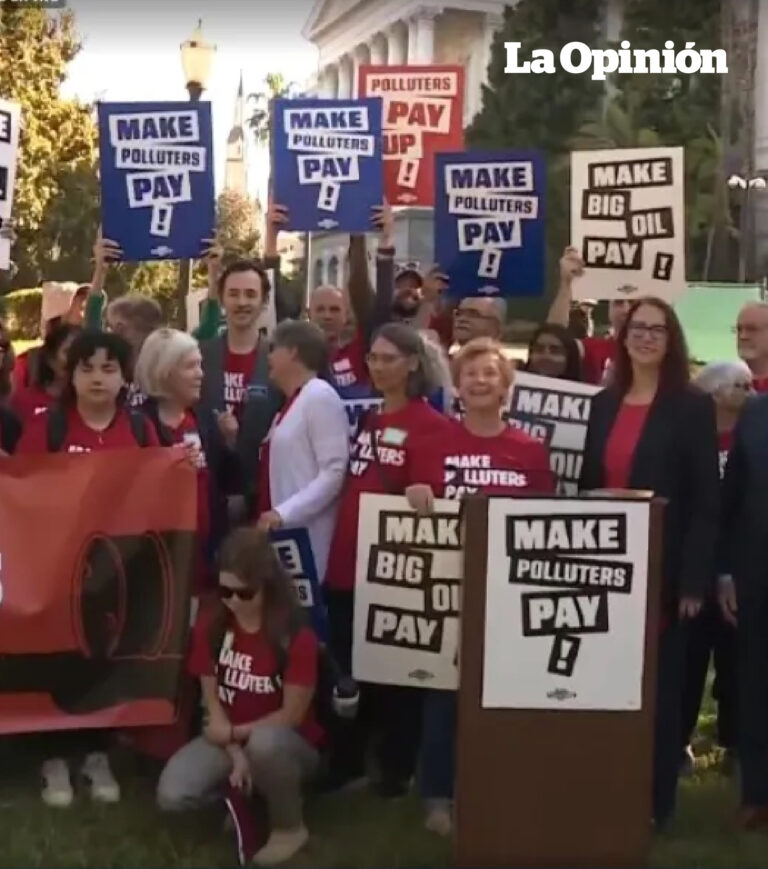A statewide campaign known as “Que No Te Engañen” is looking to unmask the lies that big oil producers tell Latino communities and at the same time, educate and support frontline communities of color that have been directly impacted by the environmental injustice caused by oil companies.
The campaign was announced and presented to the community last Thursday at a press conference at LA Plaza de Cultura y Artes in Downtown Los Angeles. The community-led campaign was launched by the La Mesa coalition, made up of California grassroots environmental organizations such as Physicians for Social Responsibility Los Angeles, the Central California Environmental Justice Network, Comité Cívicos del Valle, an Imperial Valley environmental justice organization, and the LEAP Institute.
“Our communities, our environmental justice communities, are the ones who have borne the brunt of pollution. We are still and we will, for generations to come, continue to clean up the very communities where communities of color, Latinos, end up living,” Luis Olmedo, executive director of Comité Cívico del Valle, told CALÒ News. “Fossil fuel is everywhere in this entire country, but also globally. There is no plan B. We need to protect this planet.”
A study published in March 2023 by GeoHealth, a section of the American Geophysical Union, revealed that Latino, Black and low-income Californians are more likely to live near the most intensive oil and gas operations. The study also found that while oil and gas production in California has declined over the past 15 years, the rate of decrease has been slower near racially marginalized communities. In Los Angeles County, from 2005 to 2019, non-Hispanic Black people had disproportionately high exposure to oil and gas wells at each stage of production, similar to statewide results.
The campaign hopes to build public and policy support for measures that protect the health of California’s Latino communities, including: ending oil drilling and oil wells in Latino neighborhoods, farms and lands; making oil companies clean up the environmental waste and mess oftentimes left in those communities after decades of drilling in our midst; and adopting measures that promote clean transportation, including electric vehicles, electric charging infrastructure and lithium technology.
Martha Argüello, executive director of Physicians for Social Responsibility Los Angeles, said that the urgency of launching the campaign stems from the health disparities that many oil companies cause. “Our communities are very sick. We have done a lot of work to reduce air pollution,” she told CALÒ News.
Argüello said many big oil industries attenuate their profit margins at the expense of Latino’s health and often times, spread false narratives that they are contributing to communities by bringing new jobs and revenue “We need to fight for a new economy that centers around health and justice versus extracting as much profit as possible from the Earth and from people as possible, which is what the oil industry is doing,” she said.
According to the United States Environmental Protection Agency (EPA), Long Beach and Los Angeles ports are the entry points for 40% of all imports to the U.S. and 20% of diesel particulate emissions in Southern California. In addition, highways are one of the biggest toxic emitters. ”The I-710 freeway passes through 15 cities and unincorporated areas with a population of over 1 million residents – about 70% of which are minority and disproportionately low income populations. The area is dense with truck traffic, industrial facilities, residences, schools, daycares, and senior centers,” as stated by the EPA.
Sandra Lopez, who lives in Lincoln Heights, an area connected to the I-710 freeway, was diagnosed with asthma five years ago. “The oil companies are negatively affecting my community’s health,” she told CALÓ News. “I was diagnosed with asthma, and since then, I haven’t been able to do many activities, and I get exhausted very quickly with any major physical activity.”

For 15 years, Lopez worked as a domestic house worker, but since Lopez’s asthma in the last two years, she stopped working. “I no longer have income, and I cannot help my husband with rent or with paying for our basic food, which has skyrocketed in price. I watch and compare, and I see that in our neighborhood, gasoline is more expensive, perhaps because here we are all Latinos,” she said.
For Lopez, life in the United States has not been fair, especially as someone whose health has been a constant worry. She lives in Lincoln Heights with her husband, but her three daughters, who live outside of California, worry for her health and the community she lives in. “My health started getting worse when I came to the U.S. Guatemala is filled with greenery; you can smell the fresh air and it’s full of trees and green spaces, very different from my home in Lincoln Heights,” she said.
The campaign’s official website has resources stemming from infographics, stories, and publications from ethnic media outlets like La Opinion, which address and touch on related topics like climate change issues affecting Latino communities in California, especially the damage to health and environment caused by big oil companies.
“The climate crisis is affecting us all, but it has a greater impact on low-income farmworker families in the San Joaquin Valley and similar regions,” said Rey León, CEO of The LEAP Institute in Huron, CA. “The solution is to develop, create and implement the alternatives that battle the crisis while we also empower the community through economic, social and environmental justice. Pursuing a petroleum-based status quo is unfeasible for our people, our planet and our pockets.”
In the coming months, Argüello said the campaign will work to host events that will help in reaching Latinos in L.A. and state-wide, who, on many occasions, are excluded from environmental justice initiatives and conversations.
Lopez wants other Latinos to join the campaign by sharing their stories on how big oil companies’ infrastructure is affecting their health and well-being. “I don’t want my community to continue to be deceived. Oil companies are so intelligent that they disguise everything in their own way to make us believe they are bringing jobs or opportunities to our communities when in reality they are killing us,” she said.




